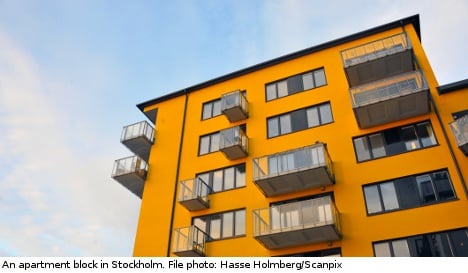PROPERTY
Report: Hard up Swedes tap parents for flat cash
More than half of home-buyers over the past three years have been unable to finance the purchase on their own, with many seeking family help, according to new statistics.
Published: 6 June 2014 10:35 CEST

Higher mortgage rates and tougher lending conditions have meant that more and more Swedes are seeking the help of relatives to finance their purchase, at levels unseen since the post-1990 crisis, according to a survey by the state-owned SBAB bank.
"The mortgage ceiling – only being able to borrow up to 85 percent of the market value, coupled with rising prices, require a fairly large down payment," said Tor Borg, chief economist at SBAB.
First-time buyers are those most affected by the situation.
"In most cases, parents come in with the down payment, alternatively friends," Borg said.
Parents are often also called in to help support loan applications, the SBAB report showed.
"The downside is that you need to have someone who can help you. For those who do not have parents who can stump up it will be difficult. It is not enough to have a permanent job."
According to Borg, the housing market as a whole – with rising house prices, housing shortages and a rental market that is not working – is the root of the problem.
"If you want to take political action, it is perhaps here you should direct the focus, instead of simply having more stringent repayment requirements."
Hans Lind, a professor of real estate economics at the Royal Institute of Technology (KTH) in Stockholm, recognizes the picture painted by the SBAB report.
According to Lind, interviews with young people show that those who go to showings of small apartments, around half would rather be renting – if there was a functioning rental market.
Lind warns of problems for those who don't have parents with available resources.
"The question to ask is: those who do not have parents who own a home that has risen in value or who have other sources of money, where do they go? What are their opportunities in the market today?"
Lind argues that the solution lies in developing a greater range of housing that caters to broader groups than those with high incomes.
"I think the politicians are aware of this and I think they take it seriously too, but then there's a lot of conflicting objectives. Sometimes it feels like housing is not really given the necessary priority."
Some 36 percent of those who bought property during the years 2012 to 2014 had co-signatories on their loans. Meanwhile, the percentage of those needing help with the down payment rose from 6 percent in the period 2000-2004, to 24 percent in 2012-2014.
Url copied to clipboard!



 Please whitelist us to continue reading.
Please whitelist us to continue reading.
Member comments